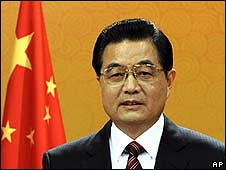
President and CPC Chairman of the People's Republic of China, Hu Jintao, has visited Africa and pledged greater cooperation between the PRC and the continent. The PRC maintains good relations with the Republic of South Africa.
Originally uploaded by Pan-African News Wire File Photos
Wall Street Journal
BEIJING—Chinese leaders called for enhanced dialogue and cooperation with the U.S. in meetings with visiting White House officials, signaling Beijing's concern that tensions over currency and other issues are again threatening ties between the world's two key economies.
U.S. National Economic Council Director Lawrence Summers, center, shakes hand with Chinese State Councilor Dai Bingguo in Beijing Tuesday.
China and the U.S. "should not regard each other as rivals," Premier Wen Jiabao said Tuesday in a meeting with U.S. National Economic Council Director Lawrence Summers and Deputy National Security Adviser Thomas Donilon. "Currently the mainstay of China-U.S. relations is dialogue and cooperation. The two countries should overcome disturbance and move forward firmly."
Mr. Summers and Mr. Donilon arrived Sunday for a series of meetings with senior Chinese officials that ends Wednesday. The trip marks the start of several months of active, high-level U.S.-China diplomacy, including expected visits by Mr. Wen and Chinese President Hu Jintao to the U.S.
The officials have a range of thorny issues to deal with, from U.S. frustration over China's currency policy to Chinese anger over U.S. involvement in the South China Sea. Economic and trade issues could come to a head soon with U.S. Congressional hearings on China's currency policies next week and midterm elections looming in November.
Jerry Seib talks to Robert Hormats, Under Secretary of State for Economic, Energy and Agricultural Affairs, about U.S. relations with China and the likely U.S. response if that country fails to address concerns about its currency and trade practices.
So far, China has accentuated the positive in official accounts of this week's meetings, which haven't mentioned the currency.
Vice Premier Wang Qishan, in a separate meeting Tuesday, said the U.S. and China should "avoid politicizing economic matters." China and the U.S. "should strengthen understanding and mutual trust through dialogue and communication," Mr. Wang told the U.S. officials, according to a Chinese government statement.
Yet there is increasing frustration in Washington that the Chinese yuan has risen less than 0.6% against the dollar since Beijing's high-profile announcement in June that the exchange rate would be more flexible.
And with lawmakers gearing up for U.S. midterm elections in November, observers think it is increasingly likely that Congress will push for legislation to penalize China for tightly controlling its currency. "On currency, the risks of legislation are definitely rising," John Frisbie, president of the U.S.-China Business Council, said in an interview Friday.
Chinese officials have consistently said that they won't change key economic policies because of foreign pressure, and argued that the exchange rate has little bearing on the U.S. trade imbalance with China. "Our exchange rate reform can't be pressed ahead under external pressure," Foreign Ministry spokeswoman Jiang Yu said at a regular press briefing Tuesday.
But senior Chinese officials have tried to address growing complaints by foreign businesses recently that they are facing greater discrimination and barriers to entry in China.
Vice President Xi Jinping, speaking at a forum in southeastern China Tuesday, said foreign companies won't face discrimination in government procurement—a particular concern of U.S. and European businesses recently. China "will adopt an open and transparent plan to let foreign companies and technological products enjoy equal treatment" in government purchases and construction projects, he said.
On Monday, China's deputy international trade representative, Chong Quan, said Beijing will encourage more imports to narrow its trade surplus. Trade officials have made similar comments before, and it's unclear how the government will follow through.
China's monthly trade surplus in July was the largest since January 2009. Some economists expect the surplus will continue to widen to about $30 billion in August. Although the U.S. is China's second-largest trade partner following the European Union, China's trade surplus with the U.S. accounted for two thirds of the total surplus in July.
"China certainly won't meet the U.S. demands on yuan appreciation," said Chen Fengying of the China Institutes of Contemporary International Relations, a government think tank in Beijing. "China will make some promises in opening up its market, but the U.S. will still be unsatisfied."
"Contradictions can't be avoided in the China-U.S. relationship, but the overall relationship won't be affected as the U.S. needs China," Mr. Chen added.
In addition to Mr. Wen and Mr. Wang, who is in charge of trade and financial policy, Mr. Summers and Mr. Donilon met with State Councilor Dai Bingguo, a top foreign-policy official, as well as Li Yuanchao, a member of the Communist Party's ruling Politburo. They are also scheduled to meet President Hu before leaving.
The coming months will present several opportunities for leaders of the two nations to talk through the issues in the relationship. In about two weeks, Mr. Wen travels to New York for a meeting of the United Nations General Assembly, during which he is also likely to meet U.S. President Barack Obama. November will see both a bilateral meeting on U.S.-China trade issues, and the summit of the Group of 20 industrialized and developing economies in Seoul. And U.S. and Chinese officials are discussing a possible visit by Mr. Hu to Washington around January.
—Liu Li
No comments:
Post a Comment